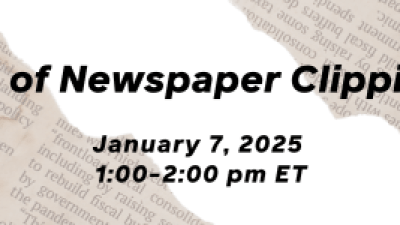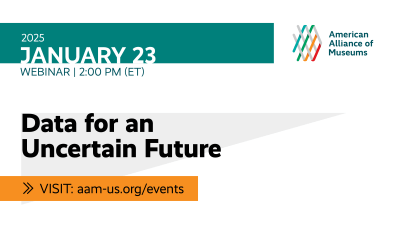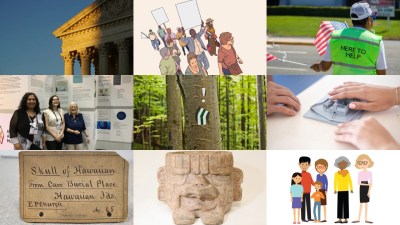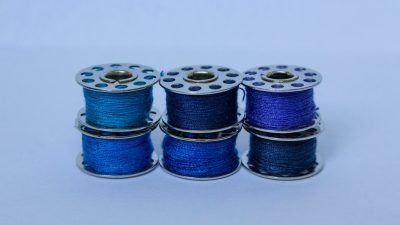
You may be grappling with the stress created by the COVID-19 pandemic, the prospect of prolonged uncertainty about the outcome of next week’s election, and 2020 generally. I certainly am, as are my colleagues at the Alliance. To help manage that stress, today’s post shares some of the resources we’ve collected to help combat fatigue, cultivate resilience, and manage stress in coming months.
It would be great if you add your own suggestions to this list—here in comments on the blog, or on Twitter by tagging @futureofmuseums @aamers.
–Elizabeth Merritt, Vice President, Strategic Foresight and Founding Director, Center for the Future of Museums
(Note: while these are free resources, many of these content providers offer fee-for-services as well. This post does not constitute Alliance endorsement of any of these websites, products, or services.)
Validating Your Experience
In case it helps to know that you are not alone:
This research from Pew Research Center confirms that “news fatigue” is a real thing, and that two-thirds of Americans feel worn out by the amount of news facing us each day. You might want to follow the advice of Kristen Houghton at Thrive Global who writes, “we do need to be informed but we also do not need the mind to be overwhelmed with dire situations all the time. Our always-on heightened level of concern is mentally exhausting and emotionally draining. Turn off the news and definitely turn off social media.”
Managing Your Stress
Research that suggests “Reading Too Much Political News is Bad for Your Well-Being.” Michelle Riba, M.D., M.S., psychiatrist and associate director of the University of Michigan Comprehensive Depression Center, recommends that you limit political content to fact-based, reputable or primary sources of information; be careful not to induce second-hand stress when talking about politics at home, work, or with friends; be open to learning about other points of view; and be willing to step away from conversations that make you uncomfortable. Also (and I think this very wise) assess why you consume political content, be aware of how it makes you feel, and prioritize your own mental health. As Gabby Bernstein puts it in her essay “How to Stay Calm When the News Stresses You Out,” “Do your part to stay informed, but be careful not to do it in a way that’s draining you and making you feel like you’re the victim of the world you see.”
Another resource from Gabby is her interview with monk Jay Shetty, who offers six lessons to managing anxiety, including my favorite—a “forward-future” meditation technique to help you avoid regret for what you did or did not do in 2020.
On Holding Difficult Conversations with Friends and Family
For me, perhaps for you as well, one big stress is talking about anything political (a growing category) with friends or family who may radically disagree with my worldview. For some wisdom on having these difficult conversations, I recommend this article by my colleague Andrew Plumley and his former colleague Kristen Lucas, written when they both worked at ProInspire. In addition to providing advice about when and how navigating these conversations, they also assembled a collection of Resources for Crucial Conversations in Difficult Times.
Another source of tools for conversations about race, equity, and social justice is Rachel Ricketts, a racial justice educator, attorney, healer, speaker, and author. Her website offers a bunch of useful resources, such as a list and links to a variety of racial justice resources, including essays, books, and podcasts, with a subsection devoted to “Healing for PBI&WOC”; and a collection of grief resources addressing racism and gender, stress and burnout, death, and a guided meditation.
Additional Content & Resources
Good Inc is “on a mission to help people and organizations be a force for good, together.” Their publication Good Is is pitched at “people who give a damn,” while Upworthy is devoted to “stories worth sharing.” These publications feature their share of pandemic and political stories, but include a hefty dose of positive news about people helping each other, and random good things happening in the world.
Intelligent Changes is a coaching and productivity company devoted to “a more mindful way of living.” Their free weekly email “Intelligent Tuesday” is a “curated newsletter of personal development tips on happiness, productivity, relationships, and more.”
The Gretchen Rubin website and blog include information on topics including timely book lists, voting and voter engagement, maximizing understanding of personality type, and focus, energy and health.
The Marie Forleo blog covers topics of grief, joy, sadness, trauma, productivity and mindset with various guests.
The Skimm offers resources, information and lists ranging from quick coverage of daily news, deeper dives on more complex stories, and breaking down “the complicated and unsexy topics when it comes to your career, your health, and your wallet.” Their site includes a “one-stop shop for non-partisan info on the candidates and the issues so you can vote with confidence.”
The Unlocking Us podcast from Brené Brown, dedicated to “Conversations that unlock the deeply human part of who we are, so that we can live, love, parent, and lead with more courage and heart,” including this recent episode – Brené with Bishop Michael Curry on Love & Hope in Troubling Times.
I hope these resources help you manage your stress in the coming days and weeks. Take care of yourself, people—remember you have to put your own oxygen mask on before you can take care of others.
Skip over related stories to continue reading article









Comments